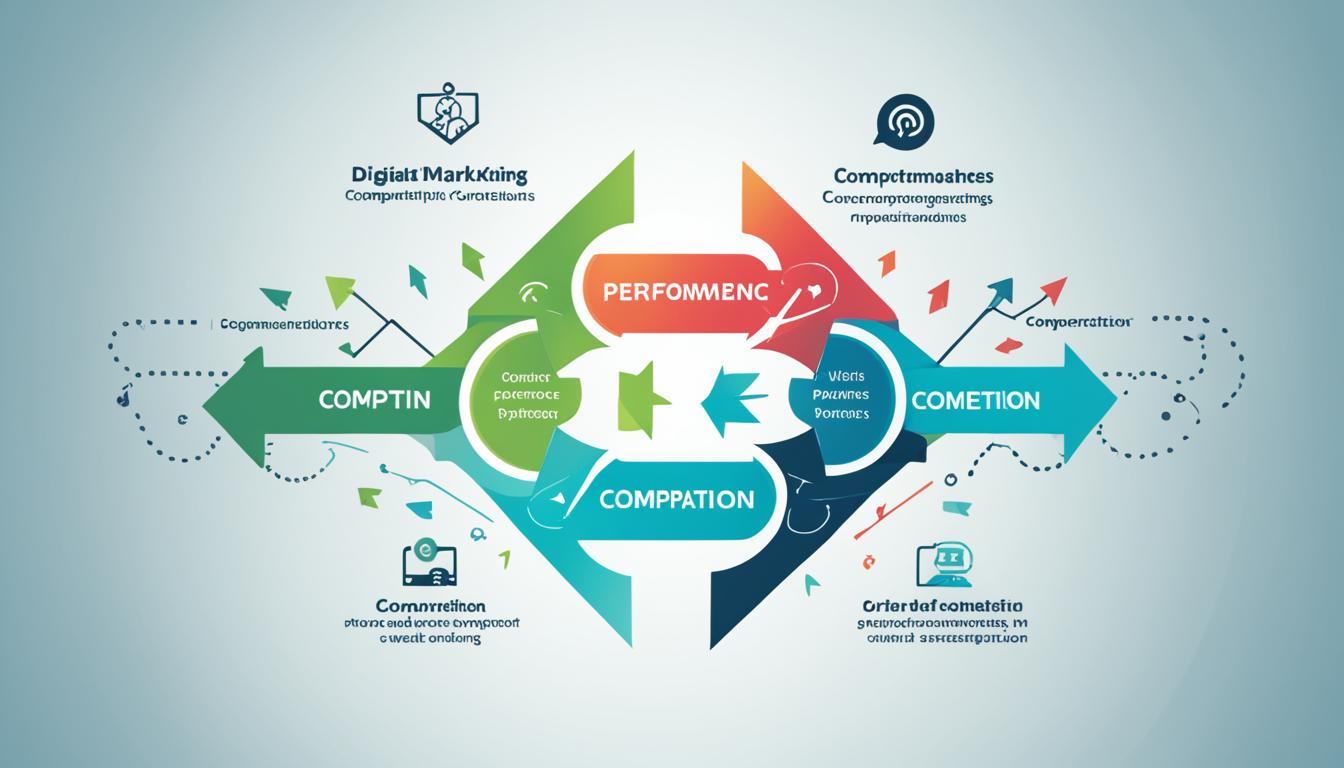Marketing and entrepreneurship are two fundamental aspects of the business world, each with its unique characteristics and contributions. Understanding the differences and synergies between them is crucial for aspiring business owners and marketing professionals. In this article, we will explore the nuances between marketing and entrepreneurship, shedding light on their key elements and exploring how they intersect in today’s dynamic business landscape.
Business and marketing go hand in hand. While entrepreneurship involves identifying opportunities, taking risks, and bringing innovative ideas to life, marketing focuses on understanding customer needs, creating value, and promoting products or services to the right audience. Together, they form the pillars of successful business growth and small business development.
Startup strategies play a vital role in both marketing and entrepreneurship. Entrepreneurs need a solid strategy to navigate the uncertainties of launching a new business, while marketers require a strategic approach to effectively communicate the value of products or services. In addition, entrepreneurship skills and digital marketing tips are essential for sustainable growth in the competitive business landscape.
Branding techniques are another important area where marketing and entrepreneurship intersect. Entrepreneurs strive to build a strong and recognizable brand identity, while marketers utilize their expertise to position the brand effectively in the market. By staying updated on the latest marketing trends, entrepreneurs can leverage marketing strategies to drive small business growth and capture market share.
An entrepreneurial mindset is crucial for both entrepreneurs and marketers. This mindset encompasses traits such as creativity, adaptability, and innovation, which are integral to success in both fields. By embracing an entrepreneurial mindset, marketers can think outside the box, identify new opportunities, and drive organizational growth through effective marketing strategies.
Key Takeaways:
- Marketing and entrepreneurship are distinct yet complementary aspects of the business world.
- Both marketing and entrepreneurship require strategic thinking and a focus on customer needs.
- Startup strategies, branding techniques, and an entrepreneurial mindset are vital for business success.
- Digital marketing tips and staying updated on marketing trends are essential skills for entrepreneurs.
- By recognizing the interplay between marketing and entrepreneurship, businesses can achieve sustainable growth and differentiation.
Definition and Scope of Entrepreneurship
Entrepreneurship is a dynamic and transformative business venture that involves identifying opportunities, taking calculated risks, and nurturing innovative ideas. It requires adaptability and a willingness to embrace change in order to navigate the ever-evolving business landscape successfully. Successful entrepreneurs possess essential qualities such as resilience, creativity, and a relentless pursuit of growth and improvement.
At its core, entrepreneurship entails the process of recognizing market gaps and unmet customer needs, and then utilizing innovative solutions to address them. By identifying and capitalizing on untapped opportunities, entrepreneurs create businesses that drive economic growth and societal progress.
Entrepreneurs are risk-takers who are not afraid to challenge the status quo. They are driven by a passion for innovation and constantly seek to create value through their initiatives. Entrepreneurs play a vital role in propelling industries forward and in fostering a culture of adaptability and resilience within the business community.
Characteristics of Entrepreneurship
Entrepreneurship is characterized by:
- Risk-taking: Entrepreneurs are willing to venture into uncharted territory and face uncertainties.
- Innovation: Entrepreneurs bring new ideas, products, or services to the market, driving progress and disruption.
- Adaptability: Entrepreneurs possess the ability to adjust their strategies and business models according to changing market dynamics.
- Opportunity-driven mindset: Entrepreneurs have a keen eye for identifying and seizing potential opportunities for growth.
- Passion and determination: Entrepreneurs are fueled by a relentless drive to succeed and make a positive impact.
By embodying these characteristics, entrepreneurs contribute to the development of both the business landscape and society as a whole.
| Key Aspects of Entrepreneurship | Description |
|---|---|
| Identifying opportunities | Entrepreneurs recognize gaps in the market and identify untapped potential. |
| Taking calculated risks | Entrepreneurs assess risks and make informed decisions to pursue their business ideas. |
| Bringing innovation to life | Entrepreneurs develop groundbreaking ideas and turn them into tangible products or services. |
| Adapting to change | Entrepreneurs are flexible and responsive to market shifts and changing customer needs. |
Key Elements of Entrepreneurship
Entrepreneurs possess essential skills and traits that contribute to their success in the business world. Key elements of entrepreneurship include:
1. Opportunity Recognition
Entrepreneurs have a unique ability to identify gaps in the market and recognize opportunities that others may overlook. They possess a keen eye for untapped potential and are always on the lookout for new ventures and innovative ideas.
2. Risk-taking
Entrepreneurs are not afraid to take risks. They understand that success often requires stepping outside of their comfort zones and embracing uncertainty. By taking calculated risks, entrepreneurs have the opportunity to achieve significant rewards and bring their ideas to fruition.
3. Innovation
Innovation is at the heart of entrepreneurship. Entrepreneurs are constantly pushing boundaries, challenging the status quo, and introducing new ideas, products, or services to the market. They thrive on creativity and are driven by their passion to create something unique.
4. Adaptability
The ability to adapt to changing market conditions is crucial for entrepreneurs. They understand that the business landscape is constantly evolving, and they must be flexible and receptive to change. Entrepreneurs embrace challenges and adjust their strategies to remain competitive.
By embodying these key elements, entrepreneurs are able to navigate the complexities of the business world and seize opportunities for growth and success.
| Key Elements of Entrepreneurship | |||
|---|---|---|---|
| Opportunity Recognition | Risk-taking | Innovation | Adaptability |
| Keen eye for identifying market gaps and untapped potential. | Willingness to take calculated risks and embrace uncertainty. | Drive to challenge the status quo and introduce new ideas. | Ability to adapt to changing market conditions and remain flexible. |
Definition and Scope of Marketing
Marketing plays a pivotal role in businesses by understanding customer needs, creating value, and promoting products or services to a target audience. It involves strategic planning, market research, branding, communication, and sales. Marketers aim to build brand awareness, generate leads, and ultimately drive revenue for a business.
Effective marketing strategies involve a deep understanding of customer needs, desires, and preferences. By analyzing market trends and consumer behavior, marketers can craft tailored messages and develop products that align with customer expectations.
Customer Needs and Value Creation
Marketing revolves around fulfilling customer needs and wants. By conducting thorough market research, marketers gain insights into the target audience’s preferences, pain points, and motivators. With this information, they can develop products or services that address customer needs and create value.
Value creation is a fundamental aspect of marketing. It involves offering products or services that meet or exceed customer expectations, providing unique benefits and solving problems. By creating value, marketers can differentiate their offerings from competitors, building brand loyalty and customer trust.
Target Audience and Customer Segmentation
Identifying a target audience is an essential step in marketing. Marketers segment the market based on various factors such as demographic, geographic, psychographic, and behavioral characteristics. This segmentation enables them to tailor their marketing efforts and messages to specific customer groups, increasing the impact and effectiveness of their campaigns.
Understanding the target audience’s preferences, interests, and behaviors allows marketers to develop targeted promotional strategies, choose the most relevant communication channels, and deliver messages that resonate with the intended recipients.
Strategic Planning and Branding
Marketing requires strategic planning to align business objectives with marketing goals. Marketers define measurable objectives, determine key performance indicators (KPIs), and outline strategies and tactics to achieve desired outcomes.
Branding is a vital component of marketing. It involves creating a distinctive identity, image, and reputation for a business or product. Through branding efforts, marketers shape the way their target audience perceives and interacts with their offerings. This helps build brand recognition, establish credibility, and foster customer loyalty.
Communication and Promotion
An integral part of marketing is effective communication. Marketers develop compelling messages to convey the unique value proposition of their products or services to the target audience. Clear, persuasive, and consistent communication across various channels, such as advertising, public relations, and digital platforms, helps build brand awareness, attract leads, and drive customer engagement.
Promotion involves utilizing various marketing tactics to raise awareness and generate interest in the offerings. This may include advertising campaigns, social media marketing, content marketing, promotions, events, and influencer collaborations.
Sales and Revenue Generation
Sales play a crucial role in marketing. Marketers collaborate with sales teams to convert leads into customers, ensuring the efforts put into generating awareness and interest translate into actual revenue. By aligning their sales and marketing strategies, businesses can streamline the customer journey, optimize conversion rates, and maximize revenue generation.
The ultimate goal of marketing is to drive revenue for the business. Whether through direct sales, lead generation, or brand partnerships, marketing efforts should focus on generating measurable results and delivering a positive return on investment (ROI).
Key Elements of Marketing
Successful marketing relies on various key elements that shape effective strategies and drive business growth. Understanding consumer behavior, employing effective communication strategies, building a strong brand identity, and positioning it within the market are instrumental in achieving marketing objectives. Let’s delve deeper into these essential elements:
Consumer Behavior
Analyzing consumer demographics, preferences, and buying habits is vital for marketers. By gaining insights into their target audience, marketers can tailor their strategies to appeal to specific consumer segments. Through thorough market research and data analysis, marketers can identify consumer needs, wants, and motivations, enabling them to craft compelling messages and tailor their products or services accordingly.
Effective Communication
Communication plays a pivotal role in connecting with the target audience and conveying the value proposition effectively. Marketers need to develop clear and compelling messaging that resonates with consumers and effectively communicates the benefits of their offerings. By employing various communication channels and utilizing persuasive techniques, marketers can capture their audience’s attention and influence their purchasing decisions.
Branding
Building a strong brand identity is key to differentiating a company from its competitors and forging a lasting connection with consumers. A well-defined brand personality, values, and visual identity can create brand recognition, loyalty, and trust. Marketers employ branding strategies to shape public perception, evoke emotions, and establish a unique position in the minds of consumers.
Positioning
Positioning refers to the strategic process of establishing a distinct and favorable position for a brand in the marketplace. Marketers analyze the competitive landscape and consumer perceptions to determine the unique value proposition that sets their brand apart. By highlighting strengths, addressing consumer pain points, and capitalizing on market opportunities, marketers can position their brand as the preferred choice in the minds of consumers.
| Elements | Description |
|---|---|
| Consumer Behavior | Understanding buying patterns and preferences of the target audience |
| Effective Communication | Creating clear and persuasive messaging that resonates with consumers |
| Branding | Establishing a unique brand identity, values, and visual identity |
| Positioning | Determining a distinct and favorable position in the marketplace |
The Interplay Between Entrepreneurship and Marketing
While entrepreneurship and marketing are distinct concepts, they share a symbiotic relationship within the business ecosystem. Entrepreneurship fuels the need for marketing, serving as the catalyst for identifying market opportunities and bringing innovative ideas to fruition. On the other hand, marketing plays a vital role in supporting entrepreneurship by promoting new products or services and creating market demand.
This interplay between entrepreneurship and marketing is essential for successful business strategies. By effectively collaborating and integrating these two disciplines, businesses can harness the power of innovation and customer-centric approaches to drive growth and achieve their goals.
Collaboration and Integration
Entrepreneurs and marketers understand the value of collaboration when developing comprehensive business strategies. By combining their expertise, they can create effective plans that target specific markets and drive success.
Marketers play a crucial role in this collaboration by leveraging their skills to identify target markets, understand consumer behavior, and craft compelling messages. They have the knowledge and experience to position new offerings effectively, ensuring they resonate with the intended audience.
On the other hand, entrepreneurs bring unique insights into the value proposition of their products or services. They understand the market gaps and the needs of their target audience, enabling marketers to create persuasive marketing campaigns that highlight the benefits and differentiate the offering from competitors.
Through collaboration, entrepreneurs and marketers can align their objectives and develop strategies that encompass both customer acquisition and product development. By working together, they can leverage their respective strengths to ensure a comprehensive and cohesive approach to business growth.
Achieving Comprehensive Business Strategies
When entrepreneurs and marketers collaborate, the result is a comprehensive business strategy that integrates market research, customer acquisition, and product positioning. By joining forces, they can create a detailed roadmap that outlines the steps required to achieve business success.
This collaborative approach enables entrepreneurs to leverage the expertise of marketers in identifying target markets and understanding consumer needs. Marketers provide valuable insights into market trends, competitor analysis, and customer segmentation, which entrepreneurs can use to refine their product offerings and tailor them to meet the demands of their target markets.
Additionally, marketers can assist entrepreneurs in crafting compelling messages that resonate with the target audience. Through effective communication and branding techniques, they can create awareness and generate interest in the entrepreneur’s products or services.
Targeting the Right Markets
One of the key benefits of collaboration between entrepreneurs and marketers is the ability to identify and target the right markets. Marketers bring their expertise in market research and data analysis to determine the most lucrative opportunities for the entrepreneur’s offerings.
Through market research, marketers can gather valuable insights into consumer preferences, demographics, and buying behaviors. This information enables entrepreneurs to refine their target audience and tailor their products or services to meet their needs effectively.
By targeting the right markets, entrepreneurs can maximize their resources and efforts, ensuring that their products or services reach the customers who are most likely to benefit from them. This targeted approach increases the chances of success and minimizes the risk of wasted resources on ineffective marketing strategies.
Leveraging Marketing for Entrepreneurial Success
Entrepreneurs can achieve great success by leveraging effective marketing strategies. Marketing plays a crucial role in creating brand awareness, generating interest in innovative solutions, and driving customer loyalty. By utilizing market research and consumer insights, entrepreneurs can refine their offerings to meet customer expectations and validate their business ideas.
Marketing strategies are essential for entrepreneurs to establish and promote their brand in the market. Through targeted campaigns and communication channels, entrepreneurs can effectively reach their target audience and create brand awareness. Building a strong brand presence not only attracts customers but also instills confidence in investors and potential partners.
Moreover, effective marketing campaigns also play a significant role in validating business ideas. By utilizing customer feedback and insights gained through marketing efforts, entrepreneurs can refine their offerings, ensuring they meet the needs and preferences of their target market. This customer validation is a crucial step in ensuring the viability and success of a business.
Market research provides entrepreneurs with valuable insights into consumer behavior, market trends, and competitor analysis. This information helps entrepreneurs identify market opportunities, understand their target audience, and create tailored marketing strategies. By staying informed about the market landscape, entrepreneurs can make data-driven decisions that drive business growth.
In conclusion, marketing strategies are instrumental in driving entrepreneurial success. By leveraging marketing techniques such as brand awareness, customer validation, and market research, entrepreneurs can create a strong foundation for their business. With effective marketing, entrepreneurs can attract customers, validate their ideas, and refine their offerings to meet market demands.
Entrepreneurial Inspiration within Marketing
Marketing professionals have the unique opportunity to adopt an entrepreneurial mindset, incorporating key qualities such as creativity, adaptability, and innovation into their strategies. By approaching marketing challenges with an entrepreneurial lens, marketers can unlock new opportunities, explore uncharted territories, and drive sustainable growth for their organizations.
An entrepreneurial mindset allows marketers to think outside the box, seeking innovative solutions to connect with their target audience. By embracing creativity, marketers can develop unique marketing campaigns that stand out in a crowded marketplace. They can create compelling messaging, captivating visuals, and interactive experiences that resonate with consumers and drive engagement.
Furthermore, adaptability is essential in the fast-paced world of marketing. By staying ahead of trends, embracing emerging technologies, and swiftly adapting to changing consumer preferences, marketers can effectively position their brands and products for success.
Using Innovation to Drive Results
Innovation is a core component of entrepreneurship, and it can significantly impact marketing success. By leveraging new technologies, data analysis tools, and marketing automation solutions, marketers can enhance their campaigns’ efficiency and effectiveness. Innovation allows marketers to uncover new insights, identify emerging market trends, and deliver impactful experiences to customers.
For example, incorporating machine learning algorithms into marketing strategies can enable marketers to personalize their messaging and target specific consumer segments with tailored content. This level of personalization can foster stronger connections with customers, leading to increased brand loyalty and higher conversion rates.
Innovation also plays a crucial role in marketing research. By utilizing advanced analytics and research techniques, marketers can gain a deeper understanding of their target audience’s preferences, pain points, and purchasing behaviors. This knowledge can guide the development of marketing strategies that genuinely resonate with consumers, driving business growth.
Overall, the integration of an entrepreneurial mindset within marketing opens up new possibilities and fosters a culture of continuous improvement and innovation. By embracing creativity, adaptability, and innovation, marketers can pave the way for success in the ever-evolving landscape of the digital age.
Marketing Strategy, Marketing Plan, and Pitch
A successful marketing campaign requires careful planning, strategic execution, and effective communication. This section explores the key components of a marketing strategy, the importance of a well-defined marketing plan, and the role of a compelling pitch in attracting investors or potential partners.
Marketing Strategy
A marketing strategy is a comprehensive plan that outlines how a company aims to meet its marketing objectives and reach its target consumers. It involves analyzing the market, understanding customer needs, and identifying the most effective ways to position and promote products or services. A robust marketing strategy aligns with the overall business goals and helps guide decision-making in various marketing activities.
Key elements of a marketing strategy include:
- Target Market: Identifying the specific group of consumers who are most likely to be interested in the product or service.
- Competitive Analysis: Evaluating the strengths and weaknesses of competitors to identify opportunities and differentiate the offering.
- Marketing Mix: Developing a well-rounded approach that combines the right blend of product, price, place, and promotion to appeal to the target market.
- Messaging and Branding: Crafting a compelling message and creating a distinctive brand identity that resonates with the target audience.
- Measurement and Evaluation: Establishing metrics and tracking progress to assess the effectiveness of marketing initiatives and make data-driven decisions.
Marketing Plan
A marketing plan serves as a detailed roadmap that outlines the specific tactics and actions to be taken to implement the marketing strategy successfully. It provides a step-by-step guide for executing marketing activities, allocating resources, and measuring the results. A well-developed marketing plan incorporates timelines, budgets, and key performance indicators (KPIs) to ensure alignment with the overall business objectives.
Components of a marketing plan may include:
- Executive Summary: A concise overview of the marketing plan, highlighting the key objectives and strategies.
- Situation Analysis: Assessing the internal and external factors that may impact the marketing efforts.
- Marketing Objectives: Clearly defining the desired outcomes and measurable goals of the marketing plan.
- Target Market and Segmentation: Identifying the specific customer segments to be targeted and tailoring marketing efforts accordingly.
- Marketing Strategies and Tactics: Outlining the specific activities and channels to be used to reach the target audience and achieve the marketing objectives.
- Action Plan: Breaking down the marketing strategies into detailed action steps, assigning responsibilities, and setting timelines.
- Budget and Resource Allocation: Allocating the necessary funds and resources to execute the marketing plan effectively.
- Monitoring and Evaluation: Establishing mechanisms to track the progress, measure the success of marketing initiatives, and make necessary adjustments.
Pitch

A pitch is a concise presentation that highlights key aspects of a marketing plan to attract investors or potential partners. It aims to showcase the unique value proposition, demonstrate market potential, and convince the audience of the viability and profitability of the proposed marketing strategies.
Key elements of an effective pitch include:
- Problem Statement: Clearly articulating the problem or opportunity that the product or service addresses.
- Solution: Presenting the unique selling points and benefits of the offering.
- Market Analysis: Providing market research and insights to support the feasibility and demand for the product or service.
- Marketing Strategies: Outlining the specific strategies and tactics that will be employed to reach and engage the target audience.
- Financial Projections: Presenting realistic revenue and profit projections based on market analysis and expected market share.
- Call to Action: Clearly communicating the desired next steps, such as seeking investment or partnership opportunities.
A well-crafted pitch captures the essence of the marketing plan, communicates the value proposition persuasively, and leaves a lasting impression on the audience.
Elements of a Marketing Plan
A well-structured marketing plan is a vital tool for businesses to achieve their marketing objectives and drive success. It outlines the strategies, tactics, and objectives that will guide marketing efforts to effectively reach target audiences and accomplish business goals. A comprehensive marketing plan includes the following essential elements:
1. Executive Summary:
This section provides an overview of the entire marketing plan, highlighting key strategies and goals.
2. Situation Analysis:
A thorough assessment of the current market landscape, including competitor analysis, SWOT analysis, and identification of opportunities and challenges.
3. Marketing Opportunity:
An exploration of potential target markets and customer segments to focus marketing efforts on.
4. Business Model:
A description of the organization’s business model, highlighting unique selling propositions and competitive advantages.
5. Marketing Objectives:
Clearly defined objectives that align with overall business goals, such as increasing brand awareness, expanding market share, or boosting customer engagement.
6. Marketing Strategies:
A detailed plan outlining the specific strategies to be implemented to achieve marketing objectives, including product positioning, pricing, distribution channels, and promotional activities.
7. Action Plan:
A step-by-step guide that outlines the tasks, responsibilities, timelines, and allocated resources necessary to execute the marketing strategies.
8. Financials:
A financial analysis that includes budget allocation, revenue projections, return on investment (ROI) estimates, and key performance indicators (KPIs) for tracking and measuring success.
9. Control Procedures:
Methods and systems for monitoring and evaluating the effectiveness of marketing activities, ensuring that objectives are met, and making adjustments as necessary.
By incorporating these elements into a well-designed marketing plan, businesses can effectively navigate the challenges of the market, make informed decisions, and maximize their chances of success.
Conclusion
Entrepreneurship and marketing are two distinct concepts that have a symbiotic relationship in the business world. Entrepreneurs, with their drive for change and innovation, disrupt industries and create new opportunities. Marketers, on the other hand, play a crucial role in understanding consumer behavior and effectively promoting products or services. By recognizing and harnessing the synergies between entrepreneurship and marketing, businesses can achieve sustainable success in today’s ever-evolving marketplace.
Entrepreneurs, with their entrepreneurial mindset, bring fresh ideas and a relentless pursuit of growth and improvement. They identify gaps in the market, take risks, and adapt to changing circumstances. Marketers, with their expertise in strategic planning, market research, and effective communication, contribute to building brand awareness, generating leads, and driving revenue.
The collaboration between entrepreneurs and marketers is crucial in developing comprehensive business strategies that address both customer acquisition and product development. Entrepreneurs provide insights into the unique value proposition, while marketers leverage their expertise in identifying target markets, crafting compelling messages, and positioning the offerings effectively.
In the dynamic business landscape, the intertwining of entrepreneurship and marketing offers immense opportunities for success. By embracing the synergies between these two disciplines, businesses can create innovative solutions, understand customer needs, and build strong brands that resonate with the target audience. The combination of entrepreneurial drive and effective marketing strategies sets the stage for business growth, competitiveness, and long-term success.
FAQ
What is the difference between marketing and entrepreneurship?
Marketing focuses on understanding customer needs, creating value, and promoting products or services, while entrepreneurship involves identifying opportunities, taking risks, and bringing innovative ideas to life.
What are the key elements of entrepreneurship?
Entrepreneurship involves opportunity recognition, risk-taking, innovation, and adaptability.
What are the key elements of marketing?
Marketing involves analyzing consumer behavior, effective communication, branding, and positioning.
How do entrepreneurship and marketing complement each other?
Entrepreneurship fuels the need for marketing by identifying market opportunities, while marketing supports entrepreneurship by promoting new products and creating market demand.
What is the importance of collaboration between entrepreneurs and marketers?
Entrepreneurs and marketers collaborate to develop comprehensive business strategies, identify target markets, and create persuasive marketing campaigns.
How can entrepreneurs leverage marketing strategies for success?
Marketing strategies can help entrepreneurs create brand awareness, validate their business ideas, attract investors, and foster customer loyalty.
How can marketers adopt an entrepreneurial mindset?
Marketers can embrace creativity, adaptability, and innovation in their approach to identify new opportunities and drive organizational growth.
What is the difference between a marketing strategy, marketing plan, and pitch?
A marketing strategy outlines how a company will reach consumers, a marketing plan is a formal business document that serves as a blueprint for achieving marketing goals, and a pitch is a concise presentation used to attract investors or potential partners.
What are the key elements of a marketing plan?
A marketing plan includes an executive summary, situation analysis, marketing opportunity, business model, marketing objectives, marketing strategies, action plan, financials, and control procedures.
How do entrepreneurship and marketing contribute to business success?
Entrepreneurship drives change and disrupts industries, while marketing creates value by understanding consumer behavior and promoting products effectively, enabling businesses to achieve sustainable success.




